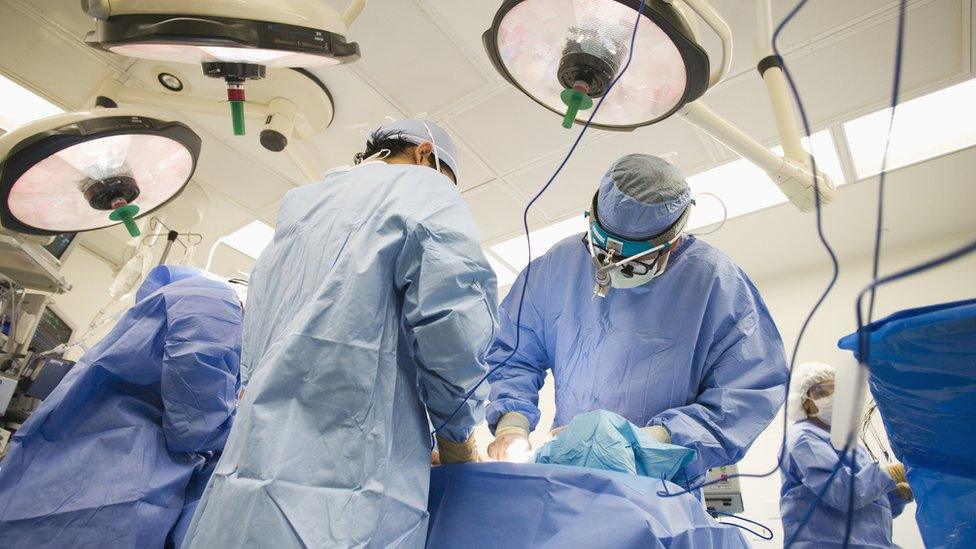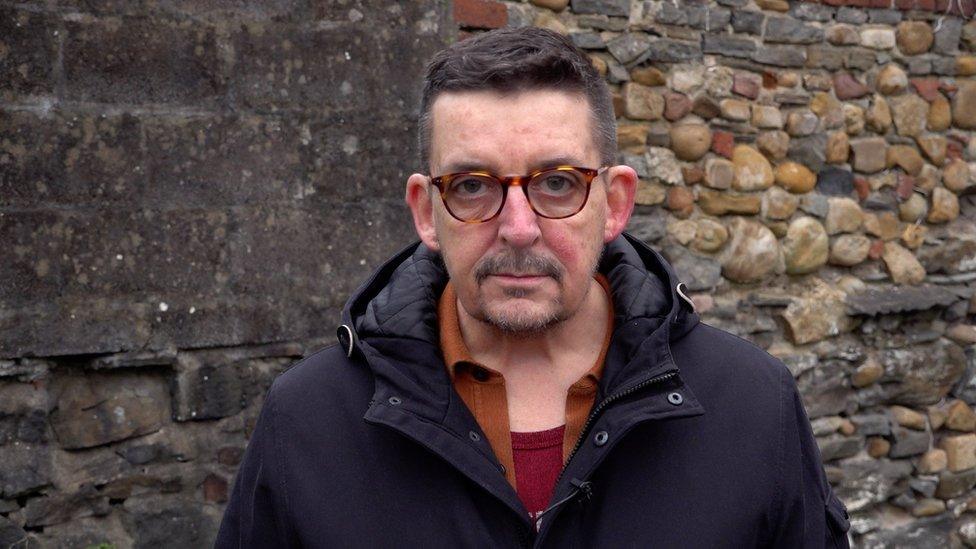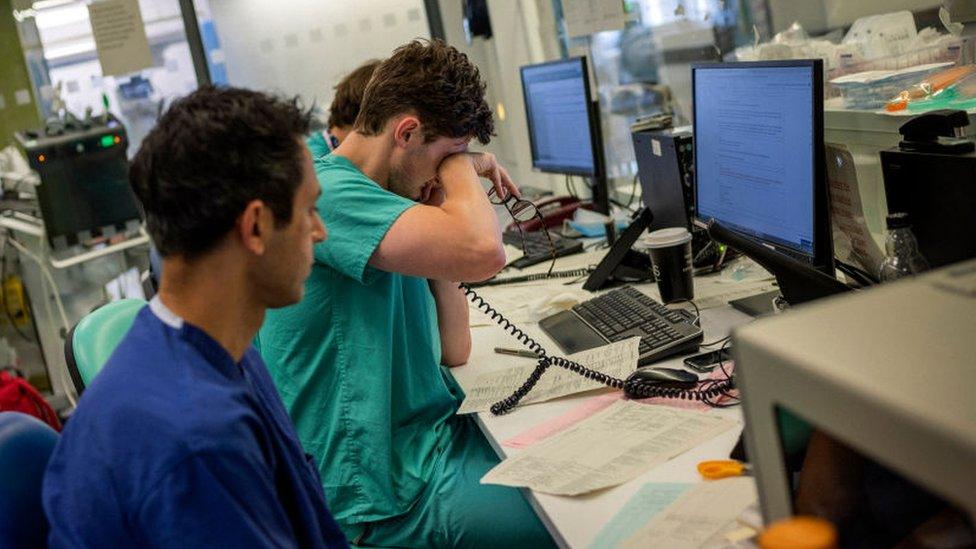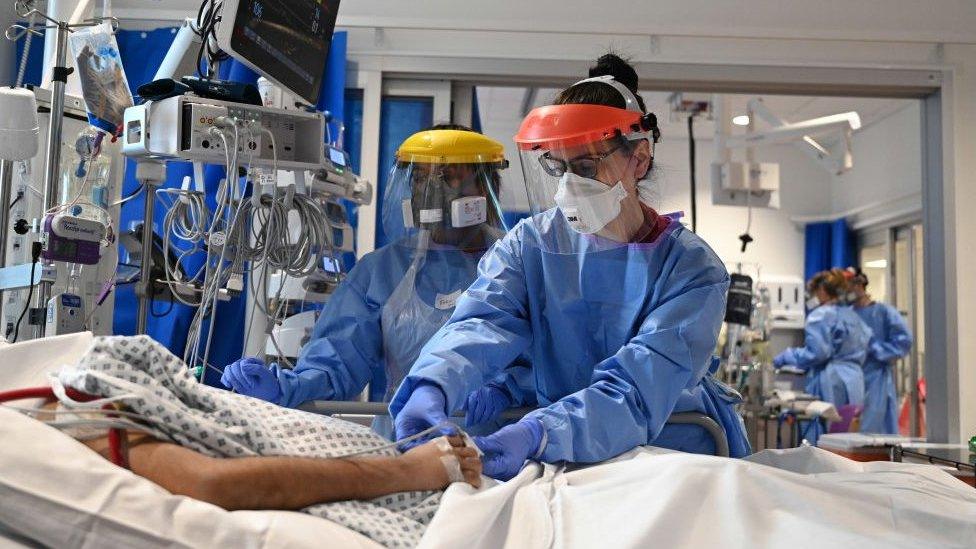NHS waiting lists: Seven years to clear Covid backlog warning
- Published

Money was made available to deal with the backlog, but the NHS was not able to spend it all
It may take seven years to get NHS Wales waiting lists of 700,000 back to 2020 levels, Wales' auditor general has said.
The number of patients waiting for non-urgent treatment has risen sharply since February 2020, prior to the Covid pandemic.
They include Michael Assender, 74, with severe back pain, one of 70,400 who've spent two years on a waiting list.
The Welsh government said it had a plan to deal with backlogs.
But Wales' Auditor General Adrian Crompton said: "Just as the NHS rose to the challenge of the pandemic, it will need to rise to the challenge of tackling a waiting list which has grown to huge proportions.
"Concerted action is going to be needed on many different fronts, and some long-standing challenges will need to be overcome."
A lot of people out there are in a constant pain and I do pity them
After struggling with his back, Mr Assender, from Cwmbran, Torfaen, paid £1,500 for a private scan, which revealed he had two slipped discs.
"At the moment I'm coping pretty well, taking pills for the pain and trying to stay active," he said.
"But something that took me half hour before now takes an hour."
Mr Assender said he knew others waiting for surgery who had become depressed and considered taking their lives, adding: "A lot of people out there are in a constant pain and I do pity them.
"It's a dire situation really."

The pandemic has exacerbated problems with waiting times in the Welsh NHS
According to Mr Crompton's report, more than half those waiting may not even know what they are suffering from because they still have not had their first outpatient appointment.
That means their care cannot be effectively prioritised.
Mr Crompton called on Welsh Labour ministers to set "ambitious delivery targets", make long-term capital investments in NHS infrastructure, create a "workforce plan" and manage "clinical risks and support for those waiting".

The report also included a web tool, external which allows people to compare waits for different health boards.
It showed 701,418 patients waiting for treatment in total, and by March, 380,289 had been on a list for up to 26 weeks, and 168,502 for more than a year.
Latest figures also show more than 70,400 waiting more than two years for treatment.
Statisticians advise these are "patient pathways" and each patient may be on several lists, meaning the actual number of patients affected could be smaller.
The report also lists a further 550,000 "potentially missing" referrals - higher than the Welsh government's own estimates of half a million - that could find their way back into the system.

What's being done?
To tackle the backlog, the Welsh government made an extra £200m available to be spent by the end of the 2021/22 financial year, but the Welsh NHS only asked for £146m.
Of this, £12.8m was returned to the Welsh government, as the health service did not have the staff or space to spend it within the timeframe.
The Welsh government said: "Working with health boards, we have set ambitious but realistic targets to tackle the pandemic backlog for planned care.
"This is backed by significant extra long-term funding.
"Our recovery plan, published last month, already sets out our plans to address the five recommendations of this report, including how we will support patients while they wait and create a sustainable workforce with effective leadership."
Health Minister Eluned Morgan told BBC Radio Cymru's Dros Frecwast programme she expects to see waiting times decrease.
"We have shown how we want to employ an additional 12,000 people and spend an extra billion pounds," she said.
"We are, therefore, confident that we will go in the right direction and will be able to stick to the plan - which is to bring those figures down by the end of this parliament."
What's been the reaction?
Darren Hughes, director of the Welsh NHS Confederation, said: "One-off, ring fenced injections of cash that are time limited do not allow the NHS to make necessary long-term investments in staff and capital required to meet the needs of the people of Wales."
He added the workforce is the "number one limiting factor for NHS capacity" and recruiting staff was a "huge focus".
"It makes for sobering reading and makes clear the enormity of the challenge ahead," Mr Hughes told BBC Radio Wales Breakfast with Claire Summers.
"These are not just numbers, these are individual people's lives."

Surgeons are struggling to deal with growing waiting lists
Vice president for Wales of the Royal College of Physicians Dr Olwen Williams said the workforce is a "key limiting factor", adding: "If you can't recruit into the workforce, you can't spend the money."
Welsh Conservatives health spokesman, Russell George, said he hoped the report would be a wake-up call for the government.
"Labour need to get a grip on the NHS and stop breaking all the wrong records," he added.
Rhun ap Iorwerth MS, Plaid Cymru's health spokesperson, said: "To see that funds were unspent proves how unsustainable and under-staffed our NHS desperately is."
He added that the NHS "needs to put on a more sustainable footing and we need a more comprehensive plan that addresses all stages of a patient's journey through the system".
Related topics
- Published20 January 2022

- Published20 January 2022

- Published23 December 2021

- Published23 December 2021

- Published18 November 2021

- Published19 August 2021

- Published20 December 2021

- Published22 July 2021

- Published18 February 2021

- Published17 June 2021
